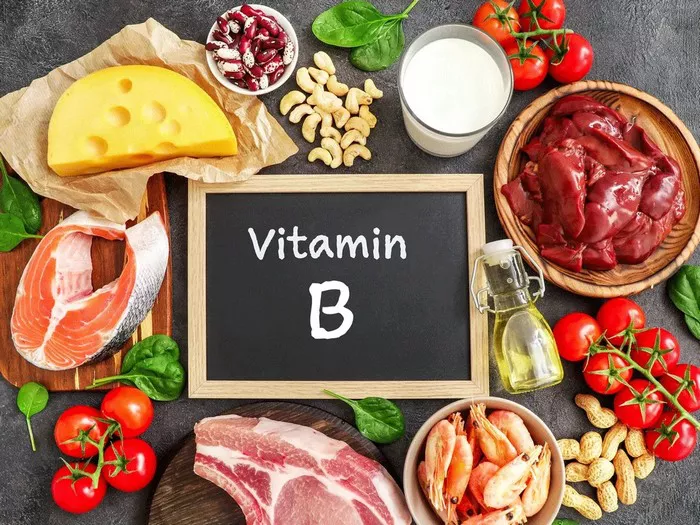Vitamin B is a group of essential nutrients that play a crucial role in maintaining overall health and well-being. From supporting energy metabolism to promoting healthy skin and nerve function, B vitamins are vital for various physiological processes in the body. In this article, we’ll delve into the world of vitamin B and explore the diverse array of foods that are rich sources of these essential nutrients.
Introduction to Vitamin B
Vitamin B is a group of water-soluble vitamins that are essential for the proper functioning of the body. There are eight B vitamins in total, each with its own unique functions and roles:
Thiamine (B1): Essential for energy metabolism and nerve function.
Riboflavin (B2): Important for energy production, cell growth, and antioxidant defense.
Niacin (B3): Plays a key role in energy metabolism and DNA repair.
Pantothenic Acid (B5): Necessary for the synthesis of fatty acids and the production of hormones and neurotransmitters.
Pyridoxine (B6): Involved in amino acid metabolism, neurotransmitter synthesis, and immune function.
Biotin (B7): Essential for the metabolism of carbohydrates, fats, and proteins.
Folate (B9): Important for cell division, DNA synthesis, and the prevention of neural tube defects during pregnancy.
Cobalamin (B12): Necessary for red blood cell formation, neurological function, and DNA synthesis.
These B vitamins work together synergistically to support various aspects of health, including energy production, nervous system function, and the metabolism of macronutrients. While deficiencies in B vitamins are relatively rare in developed countries due to the availability of fortified foods and supplements, consuming a balanced diet rich in B vitamin-containing foods is essential for optimal health and well-being.
Foods Rich in B Vitamins
B vitamins are found in a wide variety of foods, including fruits, vegetables, whole grains, legumes, nuts, seeds, dairy products, and animal-based foods. Incorporating a diverse range of these nutrient-rich foods into your diet can help ensure an adequate intake of B vitamins. Below are some examples of foods that are particularly rich sources of each B vitamin:
Thiamine (B1):
1. Whole grains (such as wheat, oats, and barley)
2. Legumes (such as lentils, beans, and peas)
3. Nuts and seeds (such as sunflower seeds and pine nuts)
4. Pork (particularly pork chops and lean ham)
Riboflavin (B2):
1. Dairy products (such as milk, yogurt, and cheese)
2. Eggs (particularly the yolk)
3. Lean meats (such as chicken, turkey, and beef)
4. Leafy green vegetables (such as spinach, kale, and broccoli)
Niacin (B3):
1. Meat (such as chicken, turkey, beef, and pork)
2. Fish (such as tuna, salmon, and swordfish)
3. Whole grains (such as wheat, barley, and rice)
4. Legumes (such as lentils, beans, and peanuts)
Pantothenic Acid (B5):
1. Meat (such as chicken, beef, and pork)
2. Avocado
3. Whole grains (such as wheat, oats, and brown rice)
4. Legumes (such as lentils, chickpeas, and kidney beans)
Pyridoxine (B6):
1. Meat (such as chicken, turkey, and pork)
2. Fish (such as salmon, tuna, and trout)
3. Potatoes (particularly the skin)
4. Bananas
Biotin (B7):
1. Egg yolks
2. Nuts and seeds (such as almonds, walnuts, and sunflower seeds)
3. Legumes (such as lentils, beans, and peas)
4. Whole grains (such as oats, barley, and wheat germ)
Folate (B9):
1. Leafy green vegetables (such as spinach, kale, and lettuce)
2. Legumes (such as lentils, beans, and chickpeas)
3. Citrus fruits (such as oranges, lemons, and grapefruits)
4. Fortified grains and cereals
Cobalamin (B12):
1. Animal-based foods (such as meat, fish, poultry, eggs, and dairy products)
2. Fortified foods (such as fortified cereals, plant-based milk alternatives, and nutritional yeast)
3. Shellfish (such as clams, oysters, and mussels)
Incorporating B Vitamins into Your Diet
Ensuring an adequate intake of B vitamins is essential for overall health and well-being. Here are some tips for incorporating B vitamin-rich foods into your diet:
Eat a Variety of Foods: Aim to include a diverse range of foods in your diet to ensure you’re getting a wide spectrum of B vitamins. Incorporate fruits, vegetables, whole grains, lean proteins, nuts, seeds, and dairy products into your meals and snacks.
Choose Whole Grains: Opt for whole grains such as brown rice, quinoa, barley, and whole wheat bread over refined grains to increase your intake of B vitamins, fiber, and other essential nutrients.
Include Lean Protein Sources: Incorporate lean sources of protein such as poultry, fish, tofu, legumes, and low-fat dairy products into your meals to boost your intake of B vitamins, particularly riboflavin (B2), niacin (B3), and cobalamin (B12).
Snack on Nuts and Seeds: Snack on nuts and seeds such as almonds, walnuts, sunflower seeds, and pumpkin seeds for a nutritious boost of B vitamins, fiber, and healthy fats.
Add Leafy Greens to Your Meals: Include leafy green vegetables such as spinach, kale, Swiss chard, and collard greens in your meals and salads to increase your intake of folate (B9) and other essential nutrients.
Choose Fortified Foods: Look for fortified foods such as fortified cereals, plant-based milk alternatives, and nutritional yeast, which are often enriched with B vitamins, particularly cobalamin (B12).
Consider Supplements: If you’re unable to meet your B vitamin needs through diet alone, consider taking a B complex supplement to ensure you’re getting an adequate intake of all eight B vitamins. However, it’s important to consult with a healthcare professional before starting any new supplements to determine the appropriate dosage and ensure compatibility with your individual health needs.
Conclusion
B vitamins are essential nutrients that play a crucial role in maintaining overall health and well-being. From supporting energy metabolism to promoting healthy skin and nerve function, these vitamins are involved in a wide range of physiological processes in the body. By incorporating B vitamin-rich foods into your diet, you can ensure you’re getting an adequate intake of these essential nutrients and supporting optimal health and vitality. From whole grains and leafy greens to lean proteins and dairy products, there are plenty of delicious and nutritious options to choose from to boost your B vitamin intake and enhance your overall well-being.
[inline_related_posts title=”You Might Be Interested In” title_align=”left” style=”list” number=”6″ align=”none” ids=”7045,6996,6992″ by=”categories” orderby=”rand” order=”DESC” hide_thumb=”no” thumb_right=”no” views=”no” date=”yes” grid_columns=”2″ post_type=”” tax=””]
































